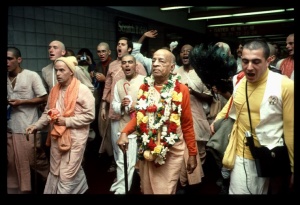BG 8.23 (1972)

A.C. Bhaktivedanta Swami Prabhupada
TEXT 23
- यत्र काले त्वनावृत्तिमावृत्तिं चैव योगिनः ।
- प्रयाता यान्ति तं कालं वक्ष्यामि भरतर्षभ ॥२३॥
- yatra kāle tv anāvṛttim
- āvṛttiṁ caiva yoginaḥ
- prayātā yānti taṁ kālaṁ
- vakṣyāmi bharatarṣabha
SYNONYMS
yatra—in that; kāle—time; tu—but; anāvṛttim—no return; āvṛttim—return; ca—also; eva—certainly; yoginaḥ—of different kinds of mystics; prayātāḥ—one who goes; yānti—departs; tam—that; kālam—time; vakṣyāmi—describing; bharatarṣabha—O best of the Bhāratas.
TRANSLATION
O best of the Bhāratas, I shall now explain to you the different times at which, passing away from this world, one does or does not come back.
PURPORT
The unalloyed devotees of the Supreme Lord who are totally surrendered souls do not care when they leave their bodies or by what method. They leave everything in Kṛṣṇa's hands and so easily and happily return to Godhead. But those who are not unalloyed devotees and who depend instead on such methods of spiritual realization as karma-yoga, jñāna-yoga, haṭha-yoga, etc., must leave the body at a suitable time and thereby be assured whether or not they will return to the world of birth and death.
If the yogī is perfect, he can select the time and place for leaving this material world, but if he is not so perfect, then he has to leave at nature's will. The most suitable time to leave the body and not return is being explained by the Lord in these verses. According to Ācārya Baladeva Vidyābhūṣaṇa, the Sanskrit word kāla used herein refers to the presiding deity of time.